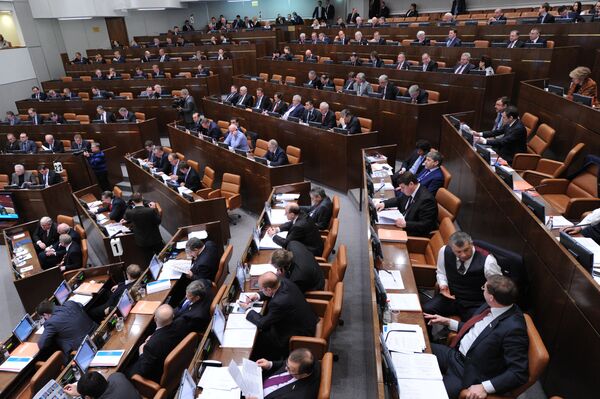Bills branding many NGOs “foreign agents,” criminalizing defamation of character and creating an internet blacklist were approved on Wednesday by the Russian Federation Council.
The upper chamber of the Russian parliament has also approved a visa deal with the United States and ratified child adoption treaties with France and the United States and Russia’s ascension to the World Trade Organization.
All the bills will have to be signed into law by President Vladimir Putin. No date for a signing was set on Wednesday.
The bill on NGOs requires all politically active nongovernmental groups who receive foreign funding to publicly label themselves “foreign agents.” Failure to comply can result in jail terms of up to four years for NGO employees.
Defamation, decriminalized by then-President Dmitry Medvedev in 2011, is now set to be punishable with fines of up to 5 million rubles ($150,000), but no jail terms.
The government is also poised to obtain the right to create a blacklist of websites that can be banned over their content. Only websites promoting illegal drugs, child abuse or suicide will be eligible for extrajudicial bans.
The three controversial bills were criticized by many rights activists, who insisted they were aimed to pressure the political opposition. The ruling United Russia party, which fast-tracked the bills through the parliament’s lower chamber, the State Duma, denied any political motivation to the laws.
The bills’ critics included the head of the presidential rights council, Mikhail Fedotov, who unsuccessfully petitioned the Federation Council to put them on hold.
“No employees of the presidential administration…are authorized to voice a position that differs from the presidential one,” Kremlin’s envoy to the upper chamber, Alexander Kotenkov, said before the vote on Wednesday.
“So you can only view this letter as citizen Fedotov’s personal opinion,” Kotenkov said.
Eighteen of 40 members of the presidential rights council quit over Putin’s return to presidency in May after his two stints at the job in 2000-2008, accusing the Kremlin of ignoring the council.
Putin has previously endorsed the bills, though he also called for minor adjustments, implemented by the Duma.
The upper chamber also rejected a bill setting up a single voting day for regional and municipal elections on the second Sunday of September, noting that the regions were not given a say on the matter.
But the senators approved most of the 40 bills set for review on Wednesday, which marked the end the chamber’s spring session, including bills on advertisement of alcohol, funding of the newly incepted public television and banking regulations during bankruptcy or economic recession.
They also approved adoption treaties with France and the United States – where some 48,000 Russian children have found new homes since 1999 – which tighten regulations on the matter. Russia put adoptions by U.S. parents on hold after a 2010 incident when an American mother sent her seven-year-old adopted son back to Russia unaccompanied on a plane.
Russia and the United States also mutually eased visa rules, allowing regular visas to be valid for up to three years.


